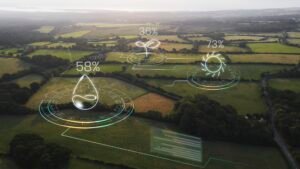Water is a critical resource in industrial operations, and its management must be precise, efficient, and sustainable. AI-driven water management systems are transforming industrial utilities by leveraging predictive analytics to optimize usage, reduce waste, and enhance operational efficiency. This shift towards smart water solutions is crucial in industries such as manufacturing, power generation, and oil & gas, where water demand is substantial and conservation is a priority.
The Role of AI in Water Management
AI-driven water management systems integrate IoT sensors, machine learning algorithms, and real-time analytics to monitor, predict, and optimize water usage. These systems utilize historical data and live inputs to forecast consumption trends, detect anomalies, and prevent failures before they occur. By incorporating AI, industrial utilities can achieve a higher degree of control over water assets, leading to improved sustainability and cost efficiency.
Key Benefits of AI-Driven Predictive Analytics in Water Management
- Real-Time Monitoring & Leak Detection: AI-powered sensors continuously track flow rates, pressure variations, and water quality, ensuring immediate identification of leaks or inefficiencies.
- Predictive Maintenance: By analyzing operational data, AI predicts potential failures in pumps, pipelines, and valves, reducing downtime and unplanned maintenance costs.
- Demand Forecasting & Optimization: AI models analyze consumption patterns to optimize water distribution and storage, preventing resource wastage and ensuring stable supply.
- Energy Efficiency Improvements: AI algorithms minimize excessive energy consumption in water treatment and distribution systems by optimizing pump operations and reducing pressure losses.
- Compliance & Regulatory Reporting: AI automates data collection and reporting for environmental regulations, ensuring compliance with industrial water usage standards.
AI-Enabled Smart Water Networks in Industrial Applications
Industries such as steel production, chemical processing, and power plants require substantial amounts of water for cooling, processing, and steam generation. AI-powered smart water networks enhance operational resilience by ensuring consistent water quality, optimizing wastewater treatment, and mitigating environmental impact. With the integration of digital twins and edge computing, industries can simulate water distribution scenarios, preemptively address supply chain disruptions, and enhance overall sustainability efforts.
The Future of AI-Driven Water Management
The integration of AI in industrial water management will continue to evolve with advancements in deep learning, edge AI, and 5G-enabled remote monitoring. As industries adopt AI-driven systems, they will experience enhanced resilience against water scarcity challenges while optimizing their resource utilization and operational costs. Investing in AI-based water management solutions is no longer an option but a necessity for industries aiming for long-term sustainability and regulatory compliance.













